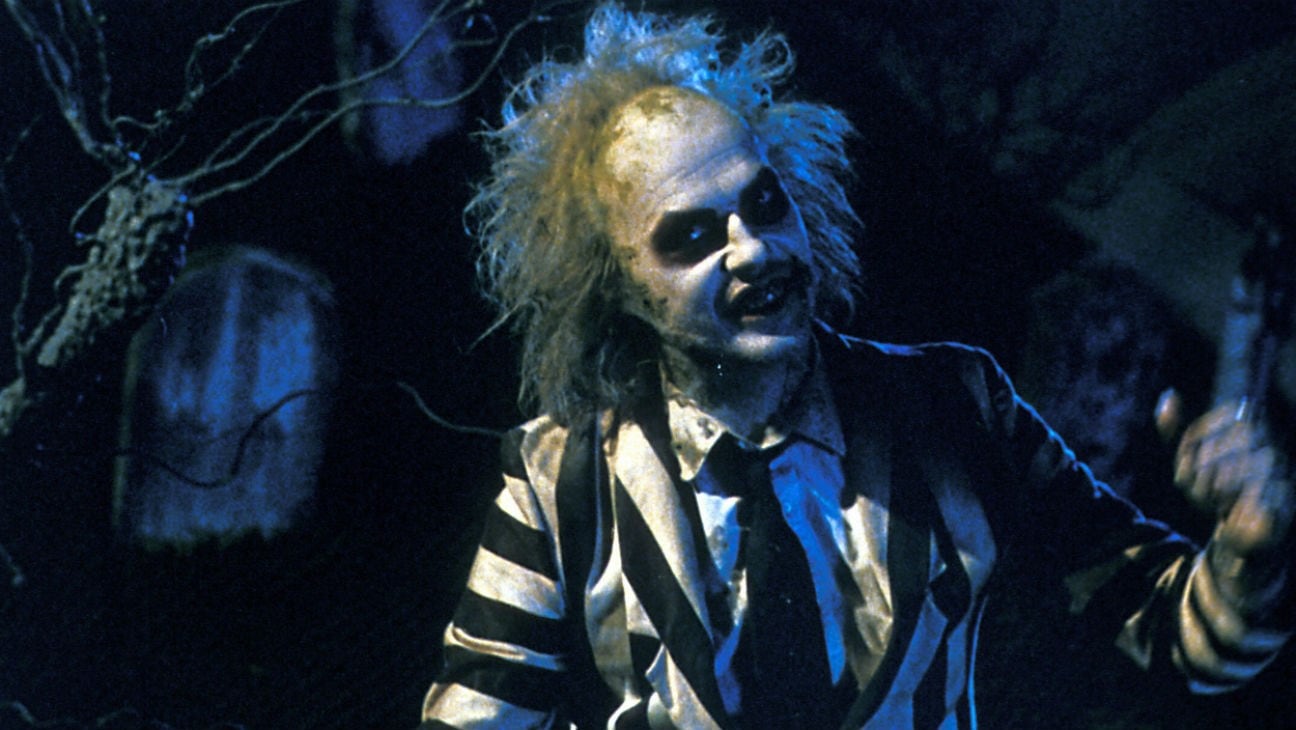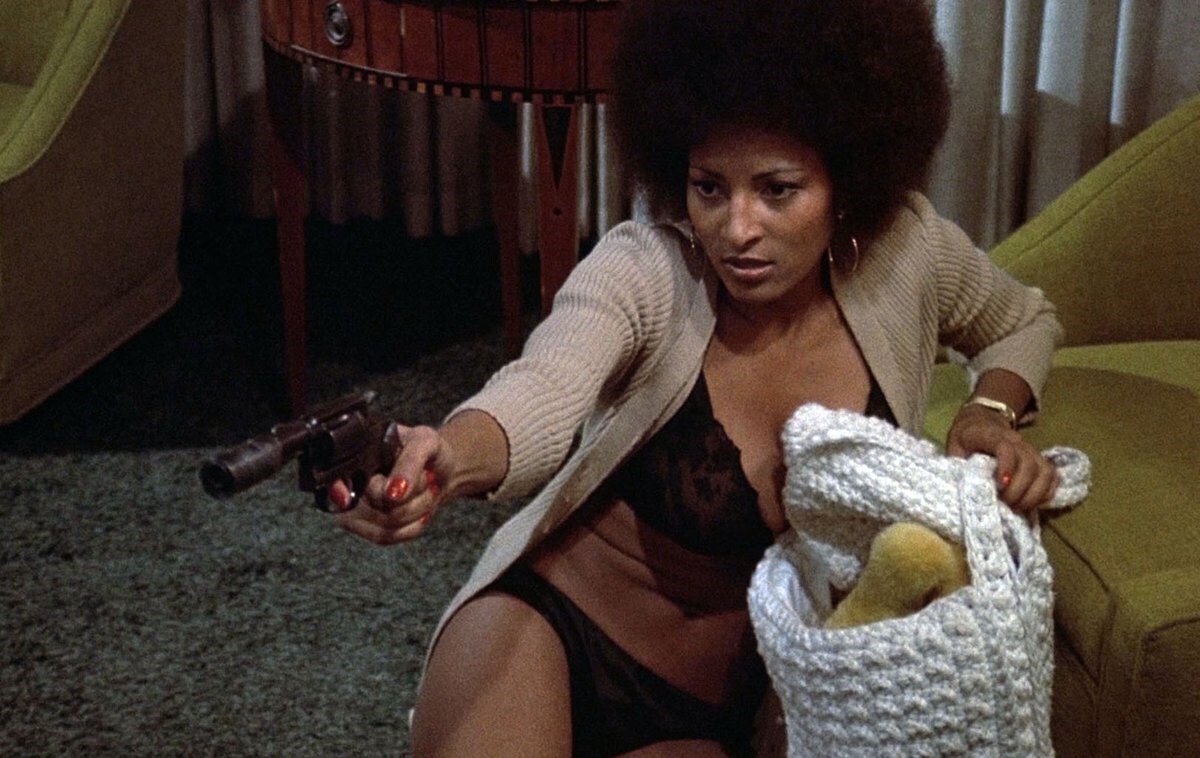A list of movies – from classics, cult favourites, hidden gems and more recent releases – currently on Netflix in the UK, to add to your watch (or re-watch) list immediately
We’ve whizzed past day 100 (week 100? year 100?) of quarantine, which means that even media-consuming has become a little tricky. Many new (non-Hamilton) releases have been delayed; TV hiatuses are going to prove interminable; and there are, of course, many more pressing things to focus on outside our screens. But for the kind of reprieve and reset we all occasionally need, old favourites and cult films on Netflix are always a strong option – the path’s well-trodden and the water’s fine. We’ve compiled some tried-and-true Netflix favourites below.
1. Beetlejuice
Here’s a strange and delightful thing (one of many) about Beetlejuice: Michael Keaton’s titular bio-exorcist doesn’t appear until more than 45 minutes into the movie, roughly half its runtime. It’s a testament to Keaton’s feverish central performance that you’ve likely forgotten he’s consigned to second-act escalation, but it’s worth remembering how much time Tim Burton spent carefully world-building. His storybook gothic visual aesthetic – all those distorted dollhouse houses and spindly-legged crawlers – came into focus here with unmistakable clarity; that makes Beetlejuice totally nuts, brilliant, required re-viewing.

2. The Breakfast Club
It’s 1984. Shermer High School. Saturday morning detention. Only John Hughes could pluck one kid from each bizarrely discrete American school movie lunch table (a jock, a geek, a goth, a punk, a princess) and bring them together to do some actual emotional work. This is the best of the Molly Ringwald-Brat Pack offerings, elevated by Emilio Estevez’s fingerless gloves and the ever-memorable Simple Minds outro. An 80s cult artifact to be reckoned with.
3. Coffy
A defining moment for Pam Grier was her 1973 role as Coffy, an ER nurse on a justified killing spree – targeting the underworld figures who contributed to her 11-year-old sister’s heroin addiction. The film sits quite firmly in the exploitation genre (so many boobs! So many stereotypes!), but has garnered cult status for the towering presence that is Coffy herself: a pre-Jackie Brown sultry action hero with a gorgeous afro and an undeniable need, as Grier has said, to fight for herself.
4. Erin Brockovich
Roger Ebert gave this stunner just two stars, apparently so distracted by “unwise wardrobe decisions” (“Roberts is a sensational-looking woman, and dressed so provocatively in every single scene, she upstages the material”) that he missed the entire point of this movie: the radically insurgent potential of unwise wardrobe decisions! Julia Roberts’ titular single mother/non-lawyer talks her way into a law firm, flirts her way into a records department, slinks through the shadowy goings-on at gas and electric behemoth PG&E in order to annihilate it. She is able to do what she does because people underestimate her, and because she understands with calculating clarity the direction in which power flows (“What makes you think you can just walk in there and find what we need?” “They’re called boobs, Ed”).
5. Ex Machina
If you’re administering the Turing test to a humanoid robot built to look like Alicia Vikander, you’ve already made a huge number of mistakes. Alex Garland’s deeply thoughtful (and truly unnerving) sci-fi thriller unfolds as a gentle programmer arrives at the secluded fortress/home of his tech company’s CEO, an Elon Musk-ish bro genius who needs an employee to determine if the woman he’s built is sentient. Garland asks a lot of quintessential genre questions here – who or what among us has self-awareness, personhood, agency? Where’s the line between creating and playing God? – but adds a lot of brilliant wrinkles about gender and power, too.
6. Okja
Bong Joon-ho does darkly comedic parables well. This one follows a young South Korean girl, Mija, and her best friend, Okja, who is a genetically modified “super pig” – one of a race of hippopotamus-gigantic, supremely intelligent creatures bred by an American corporation making advancements in technological (see: evil) meat production. After Okja is deemed absolutely prime and taken away, Mija fights to save her, venturing inside the stomach-churning underworlds of mechanised food production and corporate gluttony. This is, like Parasite, a dystopian parody: a little offbeat, with profound ambitions.
7. Funny Girl
Don’t rain on Fanny Brice’s parade, and don’t revisit Funny Girl on an interstate bus trip! I did last summer, and the experience didn’t do this Streisand classic its deserved justice. Situate yourself where you can get appropriately swept up – in the follies, the romance, the highs and the lows, Barbra singing People in that purple dress, on that stoop. She deserved this Oscar, and it’s all just as great as ever. This was also Streisand’s first film, which is easy to forget. She was a pro from the start.
8. Coming to America
Hopefully, in this year’s upcoming Coming 2 America, Eddie Murphy will reprise many of his roles from the 1988 original: his rotating band of supporting characters were essentially relocated SNL sketches, vehicles for him to continually and brilliantly manipulate his voice, face, and physicality. Coming to America provoked some controversy at the time for its parodic treatment of Africans, but it’s notably cult-y for stirring the pot in this way, and for its oddball quotability (“The royal penis is clean, your Highness”), which is universally excellent.
9. The Queen
If you recognise just one thing from Frank Simon’s documentary about the 1967 Miss All-American Camp Beauty Pageant, it’s probably Crystal LaBeija’s incredibly iconic speech in the last five minutes – a tirade on racism in drag pageant culture that resonates and holds weight still. For her words alone, the film is worth spending time with, but there are also a ton of incredible moments in the lead-up: frantic wig demanding, rehearsal drills, backstage chaos. Also, frank conversations about gender, family, the draft, America, and acceptance, all just two years before Stonewall.
10. Lady Bird
Greta Gerwig’s writing-directing debut from 2017 – which firmly solidified both Gerwig and Saoirse Ronan in our film-going hearts and minds, if they weren’t there already – has been repeatedly called “a love letter to Sacramento”. But it’s also a love letter to mothers and daughters, adolescent confusion, adult imperfection, the “wrong side of the tracks”, drama clubs and wrist casts. It’s flippant, hysterical, and also sincere; it looks squarely at the melancholy that accompanies the end of childhood; it’s girlhood storytelling, done fully and justly. It also features Timothée Chalamet sitting in a parking lot lauding things that are “anarchist”. There’s hardly a thing not to love.
11. Lost In Translation
This is a pretty perfect film, if you can set aside the few laughs it reaps from the Japanese accent’s swapped ‘L’s and ‘R’s (the “lip my stockings” sequence is comically ... bumpy). But elsewhere, Bill Murray and Scarlett Johansson, as two American strangers navigating cultural disconnection in the same Tokyo hotel, will make you laugh. They’ll make you cry, too, and acutely feel the pangs of almost-but-not-quite communing. Sofia Coppola builds a small but profound world here, one in which we’re straining to understand and to be understood – not only across linguistic divides, but also across dinner tables.
12. Princess Mononoke
Miyazaki films are magical not solely because of their magic, of which there is plenty, but also because of their incredible intricacy. Mononoke, a fable set in 14th-century Japan, surrounds the complex interrelationships between the human, natural, and supernatural worlds, especially the growing tension between technological advancement and ecological preservation during an iron revolution. In keeping with Studio Ghibli’s work, the film is stunningly visually inventive – worth the watch even, or especially, if you don’t think you’re into animation. You are now.
13. She’s Gotta Have It
Spike Lee’s very first film has since gotten the reboot and update treatment on Netflix – which it needed, by his own admissions (the politics of the original film’s climax are bewildering, to say the least). But this classic is still very worth spending time with: the story of Nola Darling juggling three boyfriends in 1980s Brooklyn contains some of the most significant, most celebratory explorations of Black female sexuality onscreen. And Lee’s early risks – filmmaking in black-and-white, employing direct address to the maximum – are fascinating, especially for fans of his later boundary-pushing.
14. True Romance
Sometimes a movie just feels like Tarantino from the first. Sometimes that movie wasn’t even directed by Tarantino – True Romance was the first feature he wrote and didn’t direct, right on the heels of his breakout Reservoir Dogs – but the man leaves such a distinctive footprint, you can usually tell if he’s even just breathed near a project. If you’re keen on the kinetic, hail-of-California-bullets early stuff, True Romance is a less-widely-known but cult-beloved entrant. Featuring Patricia Arquette’s Alabama Whitman, whose tenderhearted optimism is endlessly mesmerising – even (especially?) while she’s obliterating James Gandolfini with a makeshift flame-thrower in a cowhide mini. I don’t love everything about this movie, but I do love her.
15. American Beauty
When I was 17 and trying to be good at liking film, I watched American Beauty so I could say what a delectable satire of American upper-middle-class values it was. And it was! Sam Mendes’ directorial debut, which won the Best Picture Oscar in 2000, is biting and deeply facetious and great. But the story of middle-aged malcontent Lester Burnham (Kevin Spacey; a casting misfortune) falling for his teenage daughter’s friend hasn’t exactly aged perfectly, and also traffics in some general grossness: mockery of cookie-cutter suburbia, melancholic man rants about being a “loser”, and Fight Club-esque critiques of 90s consumer capitalism (“It’s! Just! A! Couch!”).
